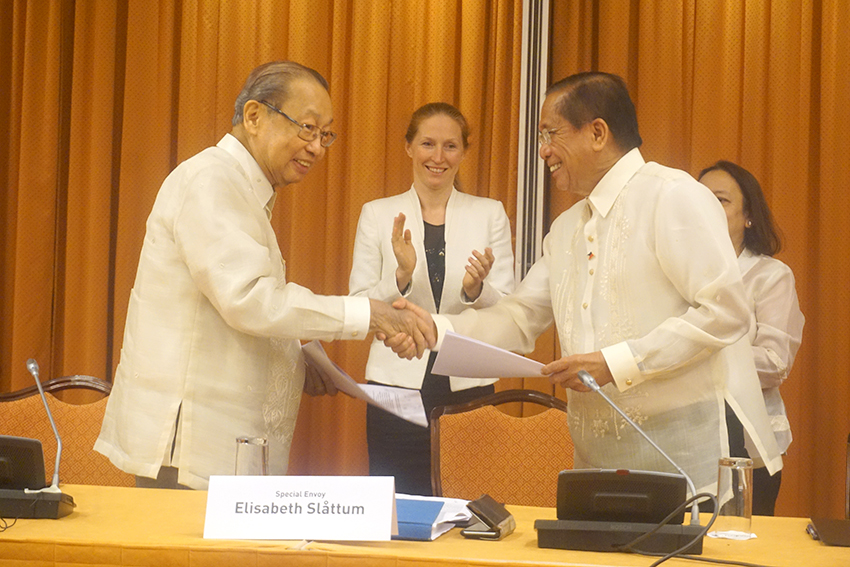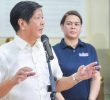
(L-R) NDFP Chief Political Consultant Jose Maria Sison, Norwegian Special Envoy to the Philippine Peace Process Elisabeth Slattum and Presidential Peace Adviser Jesus Dureza during the fourth round of talks last April 6, 2017 at the Radisson Blu Palace Hotel in Noordwijk Aan Zee in the Netherlands. (Zea Io Ming C. Capistrano/davaotoday.com)
DAVAO CITY, Philippines— With failed promises in the negotiating table, will peace talks prosper under the Duterte administration?
Apparently, the peace talks between the government and the National Democratic Front of the Philippines are heading for the rocks, according to NDFP Chief Consultant and Communist Party of the Philippines founding chairman, Jose Maria Sison.
Sison in a statement on Tuesday, pointed out that President Rodrigo Duterte was not able to fulfill his promise to release all the 400 political prisoners by issuing a general amnesty or the prosecutors’ withdrawal of the false charges of common crimes against the political prisoners.
“The promise to release all political prisoners encouraged the NDFP to agree to an acceleration of the peace negotiations on social, economic, political and constitutional reforms in order to address the roots of the now 48 years of civil war between the GRP and NDFP,” he said.
On Nov. 30, last year, government panel chief negotiator Silvestre Bello III said the 50 to 70 political prisoners will be released in December 2016.
However, only four prisoners were granted pardon in December. Bello said prisoners, Martin Villanueva, Bonifacio Soon, Dindo Absalon and Rico Bodina have long been recommended for pardon, “but the previous government did not sign the draft order to release them.”
Read related story: Agcaoili: 39 released, 39 arrested political prisoners under Duterte admin
The NDFP chief consultant said that the government has steadily backed out of its promises to release all the political prisoners “even after the 2016 peace talks in Oslo and January 2017 in Rome as well as in Noordwijk, Netherlands in April 2017.”
Sison stressed that the prisoners include NDFP political consultants who are protected by the GRP-NDFP Joint Agreement on Safety and Immunity Guarantees (JASIG), a mechanism which grants immunity and protection for the negotiators to perform their functions.
Despite the JASIG mechanisms, Sison said the President, in some of his public appearances, threatened these consultants with re-arrest and shoot-to-kill orders while they were engaged in the peace negotiations abroad.
Listed, encrypted
The government last week said the updated list of JASIG holders was recently deposited in The Netherlands.
“The list, encrypted in USB (Universal Serial Bus) flash disks and a backup security drive (sd) and locked in a safety deposit box, contains photographs and real identities of rebel consultants who are still underground,” said GRP peace panel member Atty. Angela Librado-Trinidad, who is also the supervising the Committee on JASIG and releases.
In a statement on June 21, Librado-Trinidad explained that JASIG-covered rebel consultants were issued letters of authority (LAs) by GRP panel chair Silvestre Bello III, “which they could present to police authorities and military in case they are held or arrested.”
The deposit is in line with the mandatory provisions of the Joint Agreement on Safety and Immunity Guarantee (JASIG) and supplemental guidelines, which the GRP and the NDF panels signed in 1995 and 1998, respectively, and affirmed by the administration of President Rodrigo Duterte as well as the August 26, 2016 Joint Statement as a necessary component of the peace negotiations with the NDFP.
The depositing of the USB and the backup SD card in the safety deposit box were attended by Librado-Trinidad and peace panel member Hernani Braganza from the GRP, NDFP peace panel chair Fidel Agcaoili and senior adviser Luis Jalandoni.
This was witnessed by Archbishop Joris August Odilius Ludovicus Vercammen of the Old Catholic Church of the Netherlands, the Third Party Depository, and Philippine Ambassador to the Netherlands Jaime Ledda.
No interest?
But apart from the non-release of political prisoners, Sison said the government peace panel “has blatantly shown diminishing interest in the implementation of the Comprehensive Agreement on Respect for Human Rights and International Humanitarian Law (CARHRIHL) and in the sequenced forging of comprehensive agreements on social and economic reforms, political and constitutional reforms and on the end of hostilities and disposition of forces.”
Even the Duterte administration’s economic policy, according to Sison, was adhering to neoliberal economic policy.
“Duterte has shown a lack of sustained interest in genuine land reform and national industrialization proposed by the NDFP. He has demagogically used the slogan of change only to stick to the status quo and further entrench the interests of the United States and other foreign monopolies and the oligarchy of big compradors and landlords,” Sison said.
The fifth round of talks scheduled last May this year in The Netherlands was cancelled after the government refused to participate, citing the continuing offensives of the New People’s Army.
The government is pushing for the signing of a bilateral ceasefire agreement to have an enabling environment for the negotiations.
Among the other conditions which Duterte mentioned in March before he would “embark on another journey of peace talks,” is the stopping of the NPA’s collection of revolutionary tax, and that government troops should not be prohibited from entering the territories claimed by guerrillas.
Not the end
But Presidential Peace Adviser Jesus Dureza said the cancellation of the fifth round of talks is not yet the end.
“Hindi naman end of the world ito eh. We have gone this far already, this is the fifth round… Never have we reached this particular stage in the past,” Dureza said in an interview with GMA News TV on Tuesday noon.
Dureza added that peace talks is not an easy work.
“Peace cannot be achieved at the flick of the finger, or at one meeting, it is a long process. This might be one of the setbacks, but we are… like what the President said previously, we’d like to pursue peace, not the peace of the dead, but the peace of the living,” he said.
Dureza said there is no “end of the game” yet for the peace negotiations, saying it is a process that takes “a lifetime.”
“The peace process continues, there is no magic formula to bring it automatically to happen. We have to deal with each others differences, we’ll find a common ground where we can meet and arrive at some consensus. It’s not an easy work, it’s a work of a lifetime, in fact,” he said.
Sison also said that the CPP, NPA, and NDFP are still willing to pursue the peace negotiations with the GRP “even under conditions of the severest fighting in the civil war in order to rouse and rally the people along the patriotic and progressive line.”
He said the revolutionary organizations “will explore further how to serve the interest of the people and forge the comprehensive agreements for a just and lasting peace against the oppressive and exploitative forces of foreign monopoly capitalism, domestic feudalism and bureaucrat capitalism.”(davaotoday.com)










